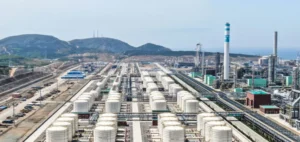Saudi Arabia is increasing its crude oil supply to China to 46 million barrels for October 2024, a significant increase on the 43 million barrels forecast for September.
The increase follows a price cut by Saudi Aramco, the country’s national oil company, for Arab Light crude, to stimulate demand in a key region.
Rising Demand in China
Major Chinese refiners such as Sinopec and PetroChina, as well as private refiners such as Rongsheng Petrochemical and Hengli Petrochemical, stepped up their purchases of Saudi crude for October.
Lower prices have prompted these companies to secure larger volumes to benefit from competitive tariffs.
Increased demand is also fuelled by the need to maintain high storage levels and meet sustained domestic consumption.
This trend reflects a proactive strategy to optimize supply costs in a context of global price fluctuations.
Saudi Aramco’s pricing strategy
Saudi Aramco has set the price of Arab Light crude for Asia at its lowest level in almost three years, in a bid to boost its competitiveness in the Asian market.
The move comes as Saudi Arabia seeks to offset an earlier decline in exports to China.
Saudi exports had fallen by 10.3% in the first seven months of 2024 compared with the previous year.
The price cut is intended to offset this decline and stimulate purchases, responding to robust demand despite increased competition, notably from Russia, China’s leading crude supplier.
Competition in the Chinese market
Saudi Arabia is China’s second largest supplier of crude oil after Russia. Chinese customs data show a decline in Saudi exports due to market competition.
Saudi Aramco’s price adjustments are a strategic response to competitive pressures, aimed at regaining lost market share.
Russia, as the main competitor, continues to have a strong presence on the Chinese market, forcing Saudi Arabia to adapt its offers to remain competitive.
Implications for the Oil Market
The increase in Saudi crude supply volumes to China for October reflects important adjustments in Saudi Aramco’s strategy.
By reducing prices, Saudi Arabia is seeking to strengthen its commercial relations with China and maintain a solid position in a changing market.
The impact of this pricing policy on relations between the two countries, as well as on the strategies of other energy producers, will be closely monitored.
Price variations and supply adjustments will continue to influence the dynamics of the Asian oil market, requiring constant attention from industry players.
Long-term outlook
Saudi Aramco’s strategic moves regarding prices and supply volumes will have lasting repercussions on commercial relationships and oil market dynamics.
Changes in demand and pricing policies will influence the future supply strategies of other producers.
Adjustments in response to market conditions and competitive pressures will determine the future direction of oil trade between Saudi Arabia and China, as well as interactions with other major producers.





















